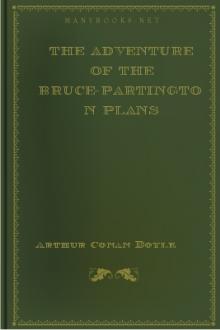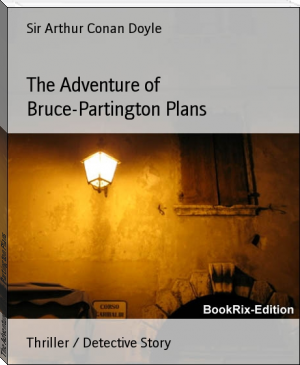The Adventure of the Bruce-Partington Plans, Arthur Conan Doyle [bts book recommendations .TXT] 📗

- Author: Arthur Conan Doyle
- Performer: 1600830110
Book online «The Adventure of the Bruce-Partington Plans, Arthur Conan Doyle [bts book recommendations .TXT] 📗». Author Arthur Conan Doyle
“Here we are, Watson—this must be the one.” He threw it open, and as he did so there was a low, harsh murmur, growing steadily into a loud roar as a train dashed past us in the darkness. Holmes swept his light along the window-sill. It was thickly coated with soot from the passing engines, but the black surface was blurred and rubbed in places.
“You can see where they rested the body. Halloa, Watson! what is this? There can be no doubt that it is a blood mark.” He was pointing to faint discolourations along the woodwork of the window. “Here it is on the stone of the stair also. The demonstration is complete. Let us stay here until a train stops.”
We had not long to wait. The very next train roared from the tunnel as before, but slowed in the open, and then, with a creaking of brakes, pulled up immediately beneath us. It was not four feet from the window-ledge to the roof of the carriages. Holmes softly closed the window.
“So far we are justified,” said he. “What do you think of it, Watson?”
“A masterpiece. You have never risen to a greater height.”
“I cannot agree with you there. From the moment that I conceived the idea of the body being upon the roof, which surely was not a very abstruse one, all the rest was inevitable. If it were not for the grave interests involved the affair up to this point would be insignificant. Our difficulties are still before us. But perhaps we may find something here which may help us.”
We had ascended the kitchen stair and entered the suite of rooms upon the first floor. One was a dining-room, severely furnished and containing nothing of interest. A second was a bedroom, which also drew blank. The remaining room appeared more promising, and my companion settled down to a systematic examination. It was littered with books and papers, and was evidently used as a study. Swiftly and methodically Holmes turned over the contents of drawer after drawer and cupboard after cupboard, but no gleam of success came to brighten his austere face. At the end of an hour he was no further than when he started.
“The cunning dog has covered his tracks,” said he. “He has left nothing to incriminate him. His dangerous correspondence has been destroyed or removed. This is our last chance.”
It was a small tin cash-box which stood upon the writing-desk. Holmes pried it open with his chisel. Several rolls of paper were within, covered with figures and calculations, without any note to show to what they referred. The recurring words, “water pressure” and “pressure to the square inch” suggested some possible relation to a submarine. Holmes tossed them all impatiently aside. There only remained an envelope with some small newspaper slips inside it. He shook them out on the table, and at once I saw by his eager face that his hopes had been raised.
“What’s this, Watson? Eh? What’s this? Record of a series of messages in the advertisements of a paper. Daily Telegraph agony column by the print and paper. Right-hand top corner of a page. No dates—but messages arrange themselves. This must be the first:
“Hoped to hear sooner. Terms agreed to. Write fully to address given on card.
“Pierrot.
“Next comes:
“Too complex for description. Must have full report, Stuff awaits you when goods delivered.
“Pierrot.
“Then comes:
“Matter presses. Must withdraw offer unless contract completed. Make appointment by letter. Will confirm by advertisement.
“Pierrot.
“Finally:
“Monday night after nine. Two taps. Only ourselves. Do not be so suspicious. Payment in hard cash when goods delivered.
“Pierrot.
“A fairly complete record, Watson! If we could only get at the man at the other end!” He sat lost in thought, tapping his fingers on the table. Finally he sprang to his feet.
“Well, perhaps it won’t be so difficult, after all. There is nothing more to be done here, Watson. I think we might drive round to the offices of the Daily Telegraph, and so bring a good day’s work to a conclusion.”
Mycroft Holmes and Lestrade had come round by appointment after breakfast next day and Sherlock Holmes had recounted to them our proceedings of the day before. The professional shook his head over our confessed burglary.
“We can’t do these things in the force, Mr. Holmes,” said he. “No wonder you get results that are beyond us. But some of these days you’ll go too far, and you’ll find yourself and your friend in trouble.”
“For England, home and beauty—eh, Watson? Martyrs on the altar of our country. But what do you think of it, Mycroft?”
“Excellent, Sherlock! Admirable! But what use will you make of it?”
Holmes picked up the Daily Telegraph which lay upon the table.
“Have you seen Pierrot’s advertisement to-day?”
“What? Another one?”
“Yes, here it is:
“To-night. Same hour. Same place. Two taps. Most vitally important. Your own safety at stake.
“Pierrot.
“By George!” cried Lestrade. “If he answers that we’ve got him!”
“That was my idea when I put it in. I think if you could both make it convenient to come with us about eight o’clock to Caulfield Gardens we might possibly get a little nearer to a solution.”
One of the most remarkable characteristics of Sherlock Holmes was his power of throwing his brain out of action and switching all his thoughts on to lighter things whenever he had convinced himself that he could no longer work to advantage. I remember that during the whole of that memorable day he lost himself in a monograph which he had undertaken upon the Polyphonic Motets of Lassus. For my own part I had none of this power of detachment, and the day, in consequence, appeared to be interminable. The great national importance of the issue, the suspense in high quarters, the direct nature of the experiment which we were trying—all combined to work upon my nerve. It was a relief to me when at last, after a light dinner, we set out upon our expedition. Lestrade and Mycroft met us by appointment at the outside of Gloucester Road Station. The area door of Oberstein’s house had been left open the night before, and it was necessary for me, as Mycroft Holmes absolutely and indignantly declined to climb the railings, to pass in and open the hall door. By nine o’clock we were all seated in the study, waiting patently for our man.
An hour passed and yet another. When eleven struck, the measured beat of the great church clock seemed to sound the dirge of our hopes. Lestrade and Mycroft were fidgeting in their seats and looking twice a minute at their watches. Holmes sat silent and composed, his eyelids half shut, but every sense on the alert. He raised his head with a sudden jerk.
“He is coming,” said he.
There had been a furtive step past the door. Now it returned. We heard a shuffling sound outside, and then two sharp taps with the knocker. Holmes rose, motioning us to remain seated. The gas in the hall was a mere point of light. He opened the outer door, and then as a dark figure slipped past him he closed and fastened it. “This way!” we heard him say, and a moment later our man stood before us. Holmes had followed him closely, and as the man turned with a cry of surprise and alarm he caught him by the collar and threw him back into the room. Before our prisoner had recovered his balance the door was shut and Holmes standing with his back against it. The man glared round him, staggered, and fell senseless upon the floor. With the shock, his broad-brimmed hat flew from his head, his cravat slipped sown from his lips, and there were the long light beard and the soft, handsome delicate features of Colonel Valentine Walter.
Holmes gave a whistle of surprise.
“You can write me down an ass this time, Watson,” said he. “This was not the bird that I was looking for.”
“Who is he?” asked Mycroft eagerly.
“The younger brother of the late Sir James Walter, the head of the Submarine Department. Yes, yes; I see the fall of the cards. He is coming to. I think that you had best leave his examination to me.”
We had carried the prostrate body to the sofa. Now our prisoner sat up, looked round him with a horror-stricken face, and passed his hand over his forehead, like one who cannot believe his own senses.
“What is this?” he asked. “I came here to visit Mr. Oberstein.”
“Everything is known, Colonel Walter,” said Holmes. “How an English gentleman could behave in such a manner is beyond my comprehension. But your whole correspondence and relations with Oberstein are within our knowledge. So also are the circumstances connected with the death of young Cadogan West. Let me advise you to gain at least the small credit for repentance and confession, since there are still some details which we can only learn from your lips.”
The man groaned and sank his face in his hands. We waited, but he was silent.
“I can assure you,” said Holmes, “that every essential is already known. We know that you were pressed for money; that you took an impress of the keys which your brother held; and that you entered into a correspondence with Oberstein, who answered your letters through the advertisement columns of the Daily Telegraph. We are aware that you went down to the office in the fog on Monday night, but that you were seen and followed by young Cadogan West, who had probably some previous reason to suspect you. He saw your theft, but could not give the alarm, as it was just possible that you were taking the papers to your brother in London. Leaving all his private concerns, like the good citizen that he was, he followed you closely in the fog and kept at your heels until you reached this very house. There he intervened, and then it was, Colonel Walter, that to treason you added the more terrible crime of murder.”
“I did not! I did not! Before God I swear that I did not!” cried our wretched prisoner.
“Tell us, then, how Cadogan West met his end before you laid him upon the roof of a railway carriage.”
“I will. I swear to you that I will. I did the rest. I confess it. It was just as you say. A Stock Exchange debt had to be paid. I needed the money badly. Oberstein offered me five thousand. It was to save myself from ruin. But as to murder, I am as innocent as you.”
“What happened, then?”
“He had his suspicions before, and he followed me as you describe. I never knew it until I was at the very door. It was thick fog, and one could not see three yards. I had given two taps and Oberstein had come to the door. The young man rushed up and demanded to know what we were about to do with the papers. Oberstein had a short life-preserver. He always carried it with him. As West forced his way after us into the house Oberstein struck him on the head. The blow was a fatal one. He was dead within five minutes. There he lay in the hall, and we were at our





Comments (0)